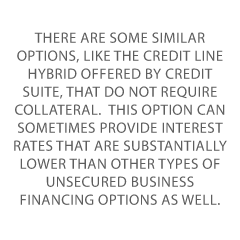A business line of credit is like a cross between a small business loan and a business credit card. It’s revolving credit, like a business credit card. However, interest is typically lower and the credit limit may be higher. On the downside, there are none of the rewards that a credit card may offer.
Requirements For A Business Line Of Credit
The application and approval process is more like a small business loan. This type of financing is generally by a traditional bank or credit union, and usually, an online lender will have a credit line option as well.
There are even some credit lines that are backed by The Small Business Administration. There are several options for the CAPlines program under the 7(a) loan program. Like an SBA loan, these usually have a more tedious application process, but the interest can be much lower than other options because the lender is taking on less risk.
Requirements for small business financing approval can vary greatly based on a number of factors. The loan amount, lender, and industry your business is in can all make a difference. However, there are some general requirements that most traditional lenders offering lines of credit want to see.
As with any business loan requirements, it’s important to recognize that while some lenders may offer a credit line with fewer requirements for credit approval than others, they often mitigate the risk this causes them to take by charging higher interest rates.
Credit Scores
Both your personal credit score and your business credit score need to be strong to get approval, just like with a loan. Most of the time a lender will have a minimum credit score requirement for small business lines of credit. However, this minimum can vary greatly between lenders.
Generally speaking, a personal credit score of 700 or higher is considered good. However, some lenders will allow for a lower score, especially if your business has a strong credit score. Others require a score higher than 700 for a small business line.
While in some cases a minimum business credit score is required, sometimes a lender will look more at the information on the credit report rather than the overall score. If you are denied due to bad business credit, you may not ever know.
This is why it is important to monitor your business’s credit report and actively work to build it so that you can be confident that it is strong and not causing denial. Credit Suite offers great business credit monitoring options.
Remember, however, that not all business credit providers will report to the business credit bureaus. In contrast to personal credit, you have to work to intentionally build business credit.
That means not only setting up a foundation to be fundable but also finding creditors that will report positive credit history, not just missed payments.
While meeting a minimum credit score requirement is necessary for approval, remember that higher credit scores can equal better terms and lower interest rates.
Also, if you have bad credit on the personal side but good business credit, you may find a lender willing to lean more heavily on business credit when it comes to business lending.
Time in Business
This is another business line of credit requirement that can vary greatly between lenders. You would be hard-pressed to find a credit line that will approve a small business in existence for less than 6 months.
More often, at least 2 or 3 years of previous tax returns, financial statements, and business bank statements are required. If you haven’t been in business that long, that is not a requirement you can meet.
Even if you can, some lenders consider the date of incorporation as the business start date. So, if you can provide documents going back that far, but you have been incorporated for less time, you may have an issue.
In addition, it is not unheard of for a lender to consider the opening date of the business bank account, or the date transactions in the account began, as a start date.
This is just one reason why it’s in the best interest of the business to incorporate and open a separate account as soon as possible.
If a small business was incorporated a year ago but only has transactions for the past 3 months in the business account, it could cause a denial.
Debt to Income Ratio
Speaking of financial statements, you’ll have to provide those. But providing them isn’t enough. Lenders are going to use the information on those statements to help make their decision. One big thing they will usually look at is the ratio of debt to income.
That is the amount of debt you already have divided by your income. The lower this ratio is, the better. They will also take into account what the ratio would be were the line of credit to be approved. This can give an idea of how much the credit line should be.
Annual Revenue
The required annual revenue for approval varies among lenders also. Virtually all of them do have a minimum, however. For this point, it is wise to use an actual income statement rather than a tax return, even if a tax return is accepted.
Here’s why. When you do your business tax return you want to make it look like you made as little as possible so you pay less in taxes. Commercial credit analysts will take that into account and add back certain expenses to get an accurate picture of revenue.
As you might expect, an income statement will make it much easier for them. The less they have to do the better. They look at cash flow in addition to revenue, to ensure that payments can be made.
Security
Most, though not all credit lines, require collateral. A business line that requires collateral is a secured line, similar to a secured loan. The security, or collateral, may be equipment, other business assets such as real estate, or the business itself.

A personal guarantee may also be necessary for a secured business line.
In cases of an unsecured business line of credit, where the collateral is not required, it should be expected that the interest rate will be substantially higher, as the risk to the creditor is greater.
There are some similar options, like the Credit Line Hybrid offered by Credit Suite, that do not require collateral. This option can sometimes provide interest rates that are substantially lower than other types of unsecured business financing options as well.
Strong Application
Obviously, you have to fill out an application to get a line of credit just like with a loan. It needs to be filled out completely and in detail. One of the factors that can often cause issues is the business plan section.
Although this is often shown as a “fill in the blank” type option on a paper application, it’s best to have a separate, professionally written presentation. If you are an already established small business, lenders are likely going to focus more on how you intend to use the funds to increase profits.
They also look at financial forecasts, also known as pro forma financial statements. If you are filling out an application online with a lender that offers online banking and this information is asked for, they aren’t looking for a guess.
Underwriters will want you to show how and why you think you will be able to increase profits by the amount you show. So do the research, get help if you need it, and be realistic.
If you do not meet every requirement perfectly, it does not necessarily mean you will be unable to get funding at all. Rather, you may have a lower credit limit or higher interest rate than you would otherwise.
How to Manage Your Business Credit Lines
There are obviously many uses for a credit line, and how you manage yours will depend greatly on how you use it. For example, if you use it for a large purchase, you may manage it more like a business term loan for a while, making equal monthly payments until it is paid off.
This can help you better manage your monthly payment and repayment term.
When it comes to managing cash flow, a credit line is a much better option than a term loan, because you will only have to pay interest on what you are using, not the entire amount. The key is to have it in place before you need it. Then, it can be used as needed.
As a small business owner, there are likely going to be many times you need more cash than what you actually have on hand.
For example, you may need more inventory that you can actually pay for in cash to meet demand. It’s also possible you could have an opportunity to purchase inventory at a discount, thus increasing profit, if you purchase more.
If you have a line of credit in place, you can purchase what you need to, and then repay the line as you sell the inventory.
Contractors can use this type of financing to purchase supplies for a contract, and then repay the draw when they receive payment for the contract.
It can be used to cover cash flow gaps due to expected seasonal dips or unexpected lulls due to various reasons. The key is, if you have it before you need it, you do not have to worry about it.
These are just a few examples of how to make this type of credit work to help you build and grow your business.
While credit cards can be used in similar ways, a business line of credit will typically have lower rates and better terms, though there are no reward options.
While individual lenders will have their own requirements for a business line of credit, there are some general factors that most will consider.
These include both business and personal credit scores, business debt ratios, time in business, and annual revenue, among other things. The limits that creditors look for in each of these will vary among lenders as well.
Credit lines are sometimes a better option than credit cards due to a potentially higher credit limit and lower interest rate.
In comparison to a term loan, a credit line is a better option for as-needed money management and expenses, while a term loan may work better for a larger purchase.
FAQs
How long do you have to be in Business to get a Line of Credit?
It varies by lender, but obviously the longer the better. Most traditional banks and credit unions will require 3 years of business tax returns. You can’t have business tax returns if you are not in business, so in those cases, you will need to have been in business for at least 3 years.
Some lenders will offer lines of credit to newer businesses. Typically, six months to one year is the cutoff for these. Businesses that have been in operation for less than 6 months are going to be hard-pressed to find a line of credit. However, the Credit Line Hybrid can work.
Often, those lenders that will approve younger businesses have higher interest rates. Just be aware.
Is it Hard to get a Business Line of Credit?
This depends on the business and the lender. Some small business owners will have no problem getting a line of credit because they easily meet even the most stringent requirements a lender may have. Of course, some lenders have easier requirements to meet than others.
So, for business owners with an established business that has strong revenue and credit scores, the process should not be hard. If you are a new business still trying to break even and without a business credit score or with a poor credit score, it will be harder.
How Long Does it Take to Get Approved for a Business Line of Credit?
This, again, depends on the lender. With traditional banks and credit unions, the whole process can take several days or even weeks. The application process and the underwriting process can take a substantial amount of time.
Online lenders may be able to offer business owners a quicker turnaround, sometimes even as quickly as instant approval and funding in your account in 24 – 48 hours. It’s important to remember that in many cases the faster you get the money, the higher the interest rate.


